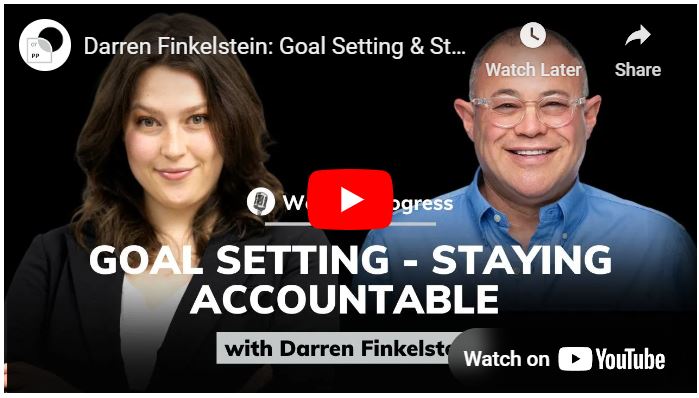Strong leadership does not start at the top. It starts with those who are being prepared to lead tomorrow. Many organisations spend time and energy trying to find the “perfect leader,” but few invest in building them from within. Forward-thinking teams understand that leadership development is not a one-time thing but part of a longer roadmap. To cultivate confident and capable leaders, it is crucial to establish the necessary foundations long before they assume leadership positions.
Discover your Accountability Score and increase the probability of smashing your GOALS and Getting Sh!t Done!
Structured mentoring plays a big part in shaping those future leaders. When done right, it does more than pass along knowledge. It builds trust, offers support, and creates chances for real growth. A leadership mentoring program helps connect experienced leaders with those still learning the ropes. This connection helps mentees gain grounded skills, insight, and a sense of purpose—helping them grow at a steady pace, with accountability built into every step.
The Role Of Structured Mentoring In Developing Leaders
At its most basic, structured mentoring is a learning relationship. One person with more experience (the mentor) helps guide another (the mentee), usually with a focus on professional growth. In a leadership mentoring program, the relationship takes on more direction. It is not just about learning the job—it is about learning to lead others with confidence, clarity, and responsibility.
So, what makes these mentoring programs structured? Planning and intention are the key components. Instead of casual chats or check-ins, the program has clear goals, set meeting times, and specific topics to cover. This gives both mentors and mentees a reliable path to follow and removes the guesswork. The structure offers clarity, which many emerging leaders appreciate, especially when they are still growing into their strengths.
Here is how structured mentoring aids in developing leadership skills:
– It creates a safe space for asking honest questions and making mistakes
– It helps build soft skills like listening, feedback, and decision-making
– It guides them through real workplace experiences with support from someone who has been there before
– It holds them accountable to action—making sure they follow through, reflect, and adapt
– It promotes long-term growth, not just fast skills
We have observed a successful outcome when a new team leader partnered with a mentor from a different department. The mentor offered perspective without workplace politics getting in the way. This cross-team approach helped the mentee learn how to lead without micromanaging, run meetings that respected everyone’s time, and manage their mindset in high-pressure moments.
The result? The mentee did not just become a better team leader; they also modelled positive leadership that flowed throughout the rest of their team.
Key Components Of A Leadership Mentoring Program
To get the most out of a leadership mentoring program, it needs more than a few meetings and vague goals. A strong program includes the right elements working together in sync. Think of it like a blueprint—with specific pillars holding it all up.
Here are a few core components of a leadership mentoring program that actually works:
1. Clear objectives
Both mentor and mentee need to know what they are working towards. That might include managing a team, learning to provide feedback, or improving delegation. Clarity gives the relationship direction and meaning.
2. Thoughtful pairing
The success of a mentoring relationship often depends on the match. Pairing should take into account leadership styles, communication preferences, and even personality. A good match supports trust and honest conversation.
3. Set structure and routine
Regular, scheduled meetings help build momentum and keep both people on track. These sessions should have purpose—whether that is reviewing challenges, reflecting on progress, or mapping out next steps.
4. Built-in accountability
Good mentoring programs do not leave things vague. They prompt mentors to check progress, give honest feedback, and help mentees reflect on what is working—and what is not.
5. Training for mentors
It is a common mistake to assume every leader is naturally a good mentor. Training helps mentors feel confident in guiding others while keeping the mentoring relationship safe and useful.
When these elements come together, leadership mentoring transcends beyond a mere checklist activity. It becomes a genuine path for growth—something that shapes future leaders before they ever take the lead.
Implementing Effective Mentoring Strategies
Once the foundation of a leadership mentoring program is in place, the next step is to bring it to life through clear, realistic strategies. Mentoring can lose its impact when it is too loose or lacks direction. Setting up a system that pulls everything together makes the difference between a vague initiative and something truly meaningful.
It starts with how mentors and mentees are matched. This should not be based on titles or availability alone. Try to learn enough about both people—their work history, how they approach challenges, and how they communicate. A mismatched pair will likely make slow or uncomfortable progress. Good matches, on the other hand, make quicker progress through real conversations and shared goals.
Once paired, goal setting keeps the mentoring sessions on track. Rather than open-ended chats, aim for outcome-driven sessions. These could include real project feedback, stepping up to lead meetings, or handling team conflict. Let the goals grow and shift as the relationship deepens.
Here are a few ways to create a more effective mentoring environment:
– Have a simple kickoff process where both parties agree on expectations
– Encourage open feedback with a short check-in every few months
– Give mentors access to tools or conversation starters to keep sessions engaging
– Keep plans flexible enough to adjust based on workload or shifting priorities
– Track basic milestones so progress stays clear and steady
Even the best mentoring plans need thoughtful review. Regular reflections help mentors spot their own blind spots, too. Mentees learn to notice patterns in how they grow, where they win, and how they react under pressure. With both taking responsibility for showing up and following through, leadership skills develop from within.
Real-Life Examples Of Mentoring Done Well
When we take structured mentoring seriously, the results surpass mere compliance. One of the most significant changes is in confidence and communication. Over time, those habits spread across teams and even entire departments.
Let us take an example from a national construction company. Mid-level project managers were usually promoted based on technical skill without any leadership support. This caused confusion, missed targets, and avoidable resignations. To fix this, the company set up a mentoring program focused on leadership behaviours rather than just capabilities.
Managers joining the program were paired with senior leads from a different division to keep feedback honest. Sessions focused on difficult topics like juggling site operations, handling disputes, and managing stress. After a year, mentees reported smoother communication, better staff performance, and stronger handovers. More importantly, they started mentoring others too.
That kind of ripple effect is tough to measure in data but impossible to ignore in culture. When leaders learn through mentoring, they do not just perform better—they make things better for the people around them.
The programs that work well have one thing in common: follow-through. There’s no need for funding or fancy materials. Just doing what they said they would. Organisations that make mentoring part of their day-to-day operations and not a side project tend to get results that last.
Empowering Your Future Leaders With Mentoring
Mentoring is one of the most human ways to shape future leaders. It is not formal training or forced frameworks. It is people learning from each other. When a future leader has someone who knows how to lead wisely by their side, they receive more than advice. They learn from lived experience.
Well-run programs turn that basic idea into something structured and repeatable. They keep people moving forward, improve communication, and grow steadily. Mentoring should not be another task to tick off. It should be a regular part of how your business builds leadership.
If your organisation wants confident leaders, calm under pressure, and committed to growth, you need to give them chances to grow within. Take the time to get mentoring right—from the matching to the feedback—and it will show in how your teams perform and connect.
Leaders built through mentoring do not just lead well. They lead with heart, honesty, and the ability to grow others too. That is how you shape the kind of leadership teams thrive under.
“Tick Those Boxes” specialises in helping individuals and organisations become more accountable. Contact our team to see how our programs may help you establish a more effective and accountable workplace, allowing you to do the things you say you will do and getting your teams to do the same.
Empowering your potential leaders takes thoughtful mentorship. It’s not just about sharing skills but nurturing a deep sense of responsibility and growth. To see how our approach to a leadership mentoring program can cultivate capable leaders ready to tackle tomorrow’s challenges, explore our coaching insights. At Tick Those Boxes, we believe in transforming accountability into every team member’s DNA and helping organisations flourish.


